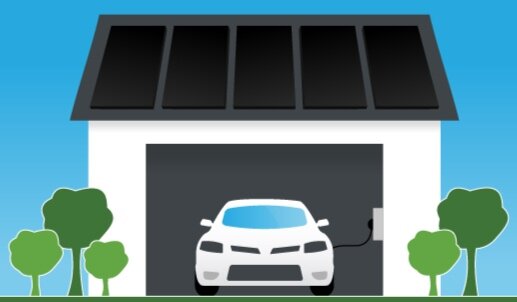In October 2019, PG&E disseminated a rosy communique to homeowners who were enrolled in their “EV-A” electric vehicle rate schedule. The letter trumpeted the benefits of their new (“EV-2”) rate schedule: Extended off-peak period, lower peak rates, the world’s now a better place … all thanks to Pacific Gas & Electric Co.
Approximately one-third of homeowners Repower has helped go solar own, or plan to acquire, an electric vehicle. And, why not? If your amortized cost to generate solar electricity is ~8 cents/kWh and you garner four miles of range per kWh, driving via sunshine (trite!) is beyond cheap, let alone ecologically awesome.
Background: In February 2019 we encapsulated and quantified the benefits of PG&E’s “EV-A” rate schedule in a blog post, specifically for homeowners who enjoyed solar and drove electric vehicles. In short, under EV-A there was a good degree of arbitrage for solar+EV owners: If you played the game, your solar system only needed to generate ~75% of the electricity you consumed to, at annual net-metering true-up, zero out your bill. This was accomplished by shifting your electrical loads — charging your car, doing laundry, running your pool pump — to off-peak periods, when electricity was valued at ~13 cents/kWh. Conversely, if your solar generation exceeded your household electricity use during peak period (2-9 p.m., Monday-Friday), you racked up credits at 45-50 cents/kWh. Simple and viable.
Today, PG&E’s electric vehicle rate schedule (EV-2) is not viable. (Side note: EV owners who enrolled in the original, EV-A, rate schedule prior to October 2019 were grandfathered in for five years, commencing the date you enrolled; such homeowners will be transitioned to EV-2 after five years.)
The net-metering calcs are stark, when contrasting three PGE time-of-use rate schedules: EV-A, EV-2 and TOU-C (PGE’s de-facto time-of-use rate schedule, whether you do or do not own an EV). The below examples are actual net-metering data from a Repower homeowner who purchased an EV (after going solar). At annual true-up, they consumed 2,157 kWh more than their solar system generated. They charged their car and did laundry at night, and programmed their pool pump to run during off-peak periods too.
First, annual metrics for a solar + EV homeowner under the original EV-A rate schedule:
Next, here’s the same homeowner under EV-2:
And, here are the results if the homeowner enrolled in TOU-C:
Same electricity use pattern, same solar generation profile, three different annual financial results:
- EV-A: $211
- EV-2: $959
- TOU-C: $623
Hence, since EV-A is not available, this electric vehicle-owning homeowner should enroll in TOU-C (and, thereby, save $336/year versus EV-2). If the homeowner had been enrolled in EV-A and was then switched, automatically by PG&E, to EV-2, their annual electricity costs would have increased $748. Ouch.
PG&E can be a pain in the posterior, particularly if you endeavor to keep up with their always changing rate schedules, time-of-use periods, and rates. If you are considering solar — and own or are contemplating an EV — feel free to contact us to receive a no-cost analysis of your net-metering options.







